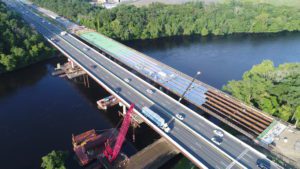Who is a member?
Our members are the local governments of Massachusetts and their elected and appointed leadership.

The Baker-Polito administration anticipates that Massachusetts will receive $8.6 billion in formula funding over five years. Of that, about $5.3 billion will go toward highways and bridges. (Photo courtesy Mass. Dept. of Transportation)
In the weeks since President Joe Biden signed the Infrastructure Investment and Jobs Act, the policy conversation has shifted to how much federal transportation money will flow to the Bay State and how it will be spent.
While an appropriations bill is still pending in Congress, the Baker-Polito administration anticipates, based on federal guidance, that Massachusetts will receive $8.6 billion in formula funding over five years. Of that, about $5.3 billion will go toward highways and bridges, and $2.8 billion will go toward public transit improvements.
A large component of the new law is the reauthorization of several federal transportation funding programs under the Obama-era Fixing America’s Surface Transportation Act, known as the FAST Act.
In federal fiscal 2022 alone, Massachusetts should see an increase of approximately 19% in formula funding for highways, from $687.7 million to $804.6 million, and an increase of about 23% for transit, from $483 million to $575.5 million.
Michelle Ho, director of capital planning for the Massachusetts Department of Transportation, recently told the State House News Service that it may be “challenging” for Massachusetts to program all of the new funding it can expect to receive in the 2022 federal spending year, which runs through the end of next September.
In addition to large formula funding increases, Massachusetts will be eligible to compete alongside other states for both new and expanded competitive grant funds.
The U.S. Department of Transportation prepared state-specific memos about the new law, which include currently available details about these grant opportunities.
For example, the new PROTECT Program would allocate $1.4 billion in competitive grants (in addition to formula funding) to eligible entities to increase the resilience of our nation’s transportation system and protect against natural disasters and other weather events.
Legislators and advocates are already discussing the impact that this once-in-a-generation infusion of federal infrastructure dollars could have on regional projects that have proven too costly or complex to get off the ground.
Sen. Eric Lesser of the Pioneer Valley, a vocal supporter of expanding rail service to Western Massachusetts, told the State House News, “For a new project like East-West Rail, it’s going to be the competitive grant formula that really makes the difference because the formula funding is likely to go to existing and legacy projects that have maintenance backlogs.”